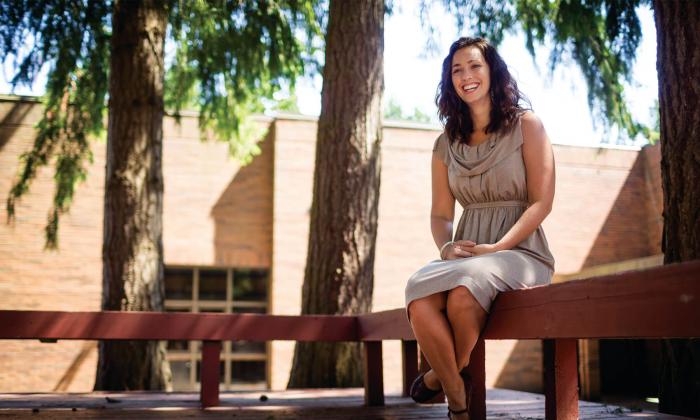Julia Zigarelli is a neophyte school psychologist but a veteran advocate. She regularly asks what she can do to support students, teachers and families. Zigarelli recently started her second year with Federal Way Public Schools in Washington state and has helped pilot a Dynamic Home Visits program. She also instituted a pilot of Positive Behavioral Interventions and Supports (PBIS). These initiatives are why her colleague, Colleen Allen, thought Zigarelli would make a great candidate for Down the Hall.
Why is your school’s home visit program important?
Dynamic Home Visits, as we call them, are grounded in research, most notably from Dr. Margery Ginsberg. There has been a dramatic shift at our school in the last five years. At one point our student population was 60 percent white and 40 percent students of color. That has flipped, and teachers need support in that shift. Educators participate in a full day of professional development before starting to make home visits. Afterwards, they are asked to debrief with each other, reflect on their practices and plan how to integrate their insights into instruction.
What are the benefits of Dynamic Home Visits?
These visits allow teachers to step out of their roles and learn about their students outside of the classroom. Our teachers say this makes their instruction more relevant and engaging. After one of our Spanish-only speaking families who had never come to school or returned a phone call received a visit, the mother started coming to every conference, calling to have us translate when she needs to talk with teachers and communicating with the school when her son will be absent. That barrier was broken down after just 30 minutes of visiting in her home. It’s a perfect example of what can happen when families feel like they are part of our community and school culture.
A colleague called you a “social justice warrior.” What does this mean to you?
My first thought is: I’m honored. Every day is an opportunity to stand up for what you believe and fight for every child, every student to be given the chance to be successful. We are given choices every day, and to me being a warrior means continuing to advocate for what you know is right.
What inspired you to become a school psychologist?
Growing up I wanted to be a teacher. After graduating from college, I moved to Santiago, Chile, to work with a nonprofit organization. It was there that I uncovered my passion for understanding and supporting learning from a psychological and social emotional perspective. I realized that I could work collaboratively with teachers and students.
What books would you recommend to other school psychologists and counselors?
• Culturally Responsive Teaching: Theory, Research & Practice by Geneva Gay
• Transformative Professional Learning: A System to Enhance Teacher and Student Motivation by Margery B. Ginsberg
• The Psychology of Multiculturalism in the Schools: A Primer for Practice, Training, and Research edited by Janine Jones
• School Psychology and Social Justice: Conceptual Foundations and Tools for Practice edited by David Shriberg, Samuel Y. Song, Antoinette Halsell Miranda and Kisha M. Radliff
How has the Positive Behavior Interventions and Supports program worked at your school?
Our school has only just begun using the program, but other schools in our district that are using PBIS have found it has the ability to create a culture that facilitates learning unlike any other framework out there. From a positive psychology perspective, you can do no harm by noticing and reinforcing the behaviors you would like to see, with students and adults. In fact, it’s as much about adults changing their behavior.
What was the biggest lesson you’ve learned through your work?
Patience! Without sacrificing integrity or giving up, you have to find ways to focus on what you can do, rather than what you can’t.
What are your plans for the next school year?
Next school year I intend to continue advocating for our students, encouraging colleagues and fellow educators to push their practice to the next level, and asking constantly: Are we doing what’s best for all kids?
Know an excellent administrator, librarian or counselor we should interview?
Tell us all about them.


0 COMMENTS